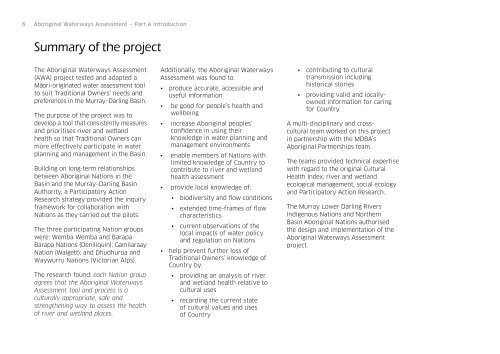Aboriginal Waterways Assessment program
dCckIF
dCckIF
You also want an ePaper? Increase the reach of your titles
YUMPU automatically turns print PDFs into web optimized ePapers that Google loves.
6 <strong>Aboriginal</strong> <strong>Waterways</strong> <strong>Assessment</strong> — Part A Introduction<br />
Summary of the project<br />
The <strong>Aboriginal</strong> <strong>Waterways</strong> <strong>Assessment</strong><br />
(AWA) project tested and adapted a<br />
Māori-originated water assessment tool<br />
to suit Traditional Owners’ needs and<br />
preferences in the Murray–Darling Basin.<br />
The purpose of the project was to<br />
develop a tool that consistently measures<br />
and prioritises river and wetland<br />
health so that Traditional Owners can<br />
more effectively participate in water<br />
planning and management in the Basin.<br />
Building on long-term relationships<br />
between <strong>Aboriginal</strong> Nations in the<br />
Basin and the Murray–Darling Basin<br />
Authority, a Participatory Action<br />
Research strategy provided the inquiry<br />
framework for collaboration with<br />
Nations as they carried out the pilots.<br />
The three participating Nation groups<br />
were: Wemba Wemba and Barapa<br />
Barapa Nations (Deniliquin); Gamilaraay<br />
Nation (Walgett); and Dhudhuroa and<br />
Waywurru Nations (Victorian Alps).<br />
The research found: each Nation group<br />
agrees that the <strong>Aboriginal</strong> <strong>Waterways</strong><br />
<strong>Assessment</strong> tool and process is a<br />
culturally appropriate, safe and<br />
strengthening way to assess the health<br />
of river and wetland places.<br />
Additionally, the <strong>Aboriginal</strong> <strong>Waterways</strong><br />
<strong>Assessment</strong> was found to:<br />
• produce accurate, accessible and<br />
useful information<br />
• be good for people’s health and<br />
wellbeing<br />
• increase <strong>Aboriginal</strong> peoples’<br />
confidence in using their<br />
knowledge in water planning and<br />
management environments<br />
• enable members of Nations with<br />
limited knowledge of Country to<br />
contribute to river and wetland<br />
health assessment<br />
• provide local knowledge of:<br />
• biodiversity and flow conditions<br />
• extended time-frames of flow<br />
characteristics<br />
• current observations of the<br />
local impacts of water policy<br />
and regulation on Nations<br />
• help prevent further loss of<br />
Traditional Owners’ knowledge of<br />
Country by:<br />
• providing an analysis of river<br />
and wetland health relative to<br />
cultural uses<br />
• recording the current state<br />
of cultural values and uses<br />
of Country<br />
• contributing to cultural<br />
transmission including<br />
historical stories<br />
• providing valid and locallyowned<br />
information for caring<br />
for Country.<br />
A multi-disciplinary and crosscultural<br />
team worked on this project<br />
in partnership with the MDBA’s<br />
<strong>Aboriginal</strong> Partnerships team.<br />
The teams provided technical expertise<br />
with regard to the original Cultural<br />
Health Index, river and wetland<br />
ecological management, social ecology<br />
and Participatory Action Research.<br />
The Murray Lower Darling Rivers<br />
Indigenous Nations and Northern<br />
Basin <strong>Aboriginal</strong> Nations authorised<br />
the design and implementation of the<br />
<strong>Aboriginal</strong> <strong>Waterways</strong> <strong>Assessment</strong><br />
project.


